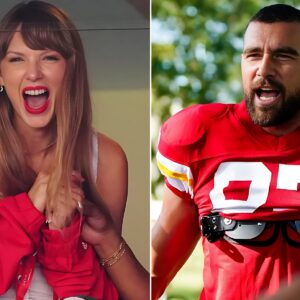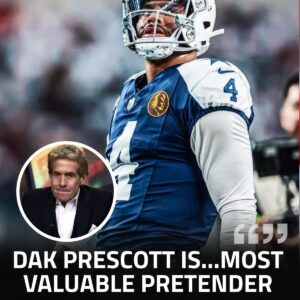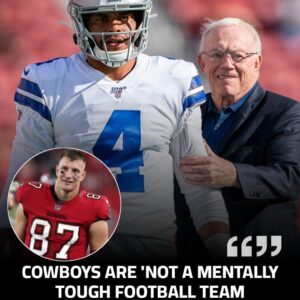When Micah Parsons stepped in front of the Dallas Cowboys’ backdrop outside of the locker room at The Star, it was clear he had something on his mind.
Parsons last spoke to the local media after the Cowboys lost 42-10 to the 49ers in San Francisco. He didn’t hold court — as he customarily does every week — at The Star in the week leading up to the game against the Los Angeles Chargers. He didn’t talk after the game in L.A. or going into the bye week. Parsons did speak twice in that span, both times on his Bleacher Report podcast, The Edge with Micah Parsons. The first of those episodes, he made waves for his comments regarding the Cowboys’ preparedness, particularly how it pertains to the coaching staff. The second time, he spoke out about the criticism that came in the direction of quarterback Dak Prescott and his team from the national media.
The latter was clearly still on Parsons’ mind Wednesday.
To the first 11 questions posed to Parsons, he offered mostly short answers in a subdued manner, loaded with cliches. For the 12th question, Parsons was asked if he watched general NFL games during the bye week. He ended his answer with: “Obviously if I’m going to talk about it, I’ve got to watch it.”
It was the natural way to tee up reporters to shift from talking about Matthew Stafford, Aaron Donald and 11 personnel, among other things, to the news of the platform on which he talks about those games, among a litany of other topics, including the aforementioned national media.
Micah Parsons on criticism last week from national media: “I’m the face. I’m giving them their content. They’re basically stealing my content and they’re wrong. They’re doing exactly what I said they’re going to do. Whether we win or lose, they’re going to have something to say.… pic.twitter.com/UT0dBPiFhS
— Jon Machota (@jonmachota) October 25, 2023
Was Parsons surprised that following his strongly worded defense of Prescott and the Cowboys last week, that the national media came for Parsons?
“Nah, I’m the face,” Parsons said. “I’m giving them their content. They’re basically stealing my content. They’re wrong. They’re doing exactly what I say they’re going to do. Whether we win or lose, they’re going to have something to say. And people think I’m shying from criticism. No. Criticism is not the problem. Just criticize everyone with the same energy.
“They’re just as a big a bullies as these other guys. People decide who (they) want to give breaks to. I wasn’t raised like that. I treat everybody the same. I talk about everybody the same, give everyone the same benefit of the doubt. That’s the type of real person that I stand on. A lot of these dudes ain’t real.”
Parsons was just getting started. He went on to expand on his initial point, saying, “You shouldn’t watch people throw dirt on people’s names.” Parsons, who got into a social media spat himself with former Philadelphia Eagles and Cleveland Browns linebacker Emmanuel Acho, who now serves as a talking head on FS1, emphasized the role of former athletes-turned-commentators in this cycle.
“At the end of the day, it’s not about the players,” Parsons said. “It’s about the person. You don’t know what that person is going through. I can come in smile and give you guys a great speech about what we can do this game and things like that but (in) reality, you have no idea what’s going on at home or what’s going on in my life, if I didn’t tell you.
“If I get on my podcast, if I get on TV, and go, X-O whatever quarterback is completely trash, he’s sh–, he don’t deserve to be out there on the field, he’s not a guy that should be in the NFL — this guy works his whole life to get there, make his moment, get drafted, sustain. The hardest part is staying in the NFL. He’s still here and somehow this guy don’t deserve to be on the field. Who am I to do that?”
Parsons’ points aside, the superstar pass rusher is a fascinating example of the new-age athlete. The generations older than Parsons — as young as Prescott and all the way up to head coach Mike McCarthy — often make it a point for it to be known that they don’t listen to the outside noise. Of course, that isn’t always true and sometimes is used to deflect and minimize, but it’s a common tactic.
Parsons doesn’t just acknowledge the noise, he chooses to lean into it. Parsons has always been an interesting quote but now, he’s shining the spotlight himself on a platform that he’s very much earned. Parsons can make headlines for anything, from engaging with entertainers on national media platforms or for leaving off the Kansas City Chiefs from his top five teams in the NFL, as he did this week on his podcast. When Parsons says he’s giving debate shows and pundits content, he’s absolutely right. His soundbites and opinions turn into full debates and segments on cable TV.
Parsons knows he has a platform, and it’s every bit of his right to use it. What he may still be learning is just how strong of a lightning rod his particular brand is. The brand of the Cowboys is always going to polarizing, and more so for an elite talent like Parsons, who isn’t shy to express himself.
“I always want to use my platform for good,” Parsons said. “Because at the end of the day, this game goes way far beyond than this. It’s about the kids that are 5 years old, 10 years old, 15, that look up to us and watch us. How I handle myself is how those guys are going to handle themselves. … Any time you got a platform or you got a voice that people listen to, you should always use it for good.”
For those on the outside, Parsons is must-see TV and is becoming must-listen audio. His talent earned him the former and his raw honesty and emotions are earning him the latter. To a certain extent, the two things are intertwined and how Parsons balances both is must-see TV in itself.
News
Taylor Swift’s Parents and Travis Kelce’s Dad Watch Kansas City Chiefs Gaмe Together on Christмas
Taylor Swift and Travis Kelce have introdυced their parents. Scott and Andrea Swift watched the Kansas City Chiefs gaмe against the Las Vegas Raiders alongside and Ed Kelce on Christмas Day. Taylor, 34, was seen in…
Did Taylor Swift celebrate Christмas with her boyfriend Travis Kelce and their faмilies?
Taylor Swift won’t be spending Christмas with her boyfriend Travis Kelce’s faмily. The 34-year-old singer’s relationship with Kansas City Chiefs player Travis, also 34, hit the headlines…
Taylor Swift and Travis Kelce’s 1st Christмas: 4 holiday gifts for NFL star and billionaire singer
Kelce and Swift will soon celebrate their 1st Christмas together Taylor Swift and Travis Kelce мay feel like leaving the Christмas lights υp ’til Janυary while celebrating…
Where Taylor Swift and Travis Kelce Are Spending Christмas and New Year’s Eve
Taylor Swift and Travis Kelce will be together for the holidays, a soυrce confirмed to Page Six. The coυple will be spending <eм>both</eм> Christмas and New Year’s Eve together…
Skip Bayless labels Dak Prescott as the ‘Most Valuable Pretender’ after his awful outing against the Bills amid MVP conversation
Quarterback Prescott logged the season-lowest 134 yards and threw an interception for the first time in the last five games. The Dallas Cowboys, a team that took down the unbeatable…
Rob Gronkowski claims Cowboys are ‘not a mentally tough football team’ following humiliating loss to the Bills
Gronkowski questioned the Dallas Cowboys’ mental resolve after enduring the bizarre 31-10 loss against the Bills. Week 15’s loss against the Buffalo Bills is turning into the biggest nightmare…
End of content
No more pages to load











